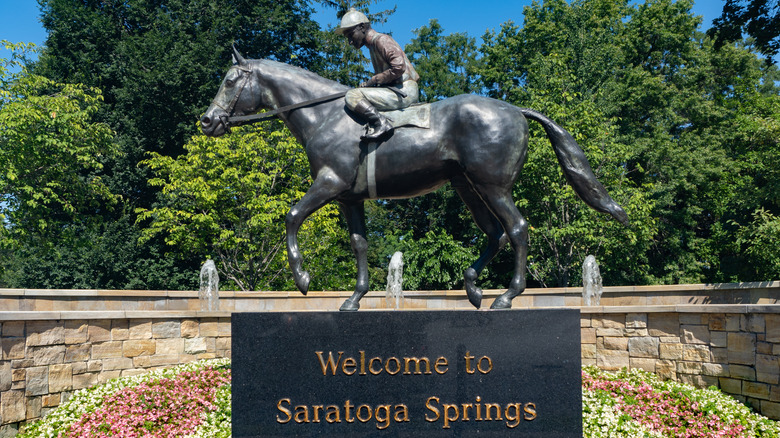The Crunchy, Messy Origins Of The Potato Chip
Potato chips are surely one of the greatest inventions in the history of snacking, but nobody knows who deserves the credit. Many apocryphal tales describe the chip's origin, but it's a mystery as to which, if any, is true. Of course, there are still many benchmarks in chip history that we do know are true, and even though we can't pinpoint their exact origin, their story is still fascinating. You see, before Lay's and Fritos began mass-producing them in the 1930s, potato chips weren't the common snack they are today. In fact, before they were Flamin' Hot or covered in chocolate, chips belonged to the highest echelons of cuisine.
Yes, believe it or not, potato chips were once considered a restaurant delicacy. You could find them at upscale hotels like the Cadillac in Detroit, where they were served alongside chicken salad in aspic (one of those classic old-time jellied dishes that our culture has thankfully since grown out of). Beyond hotels and fine restaurants, Potato chips were served aboard luxury ocean liners, and they were once considered so fancy that Tiffany made a sterling silver serving platter just for presenting them. Still, one question remains. Which restaurant started this trend by being the first to serve potato chips? The most common version of the tale will tell you it's Moon's Lake House in the resort town of Saratoga Springs, New York.
The mysteries of Moon's Lake House
The most widespread origin story says potato chips were born out of spite. George Crum was a celebrated chef of Black and Indigenous ancestry whose famous recipes for fish and wild game have led some to call him America's first celebrity chef. In the summer of 1853, he was cooking at Moon's Lake House when railroad tycoon Cornelius Vanderbilt came in for a meal. Vanderbilt apparently took issue with the fried potatoes he was served and sent them back to the kitchen complaining they were too thick. Crum had no patience for such fussy demands, so he sliced potato as thinly as he possibly could and intentionally overcooked the pieces. Though meant as a gesture of antipathy, Vanderbilt ended up loving the potato crisps.
Realizing the restaurant had a hit on its hands, proprietress Harriet Moon decided to add fried potatoes to the menu. Served in paper cones, they became the signature dish of Moon's Lake House. Word of the crispy treat spread like wildfire, and customers flocked to the restaurant just to get a taste of "Saratoga Chips," as they became known. Boosted in no small part by the success of his savory innovation, Crum opened his own restaurant in 1860. At Crum's Place, as it was known, diners were met with a basket of potato chips when they sat down. Virtually every scholar agrees that Crum deserves credit for popularizing potato chips. But did he invent them?
Other origin stories
There are too many cracks in the Crum story for it to hold water. First of all, Cornelius Vanderbilt could not possibly have dined at Moon's Lake House in the summer of 1853 as he spent that season touring Europe. Furthermore, Moon's Lake House wasn't even Moon's Lake House back in 1853, as the Moons only purchased it the following year. And while Crum was somewhat of a celebrity in his time, no contemporary reports mention fried potatoes among his specialties. Instead, it appears that the Vanderbilt anecdote originated in an advertisement 120 years after chips were supposedly invented. Then in 1977, one of Vanderbilt's descendants published a cookbook that placed the tycoon at the center of the story.
Other theories also involve the Lake House. An 1849 article from the "New York Herald" mentioned a cook at the restaurant who was famous for her fried potatoes. She is identified only as "Eliza," giving us little to go on. In 1917, an obituary for Crum's sister Catherine Wicks claimed she accidentally invented potato chips. But the earliest evidence of potato chips actually comes from an 1817 cookbook by English doctor William Kitchener. He called them "potatoes fried in slices," but the fundamental concept was the same. This doesn't necessarily mean that Kitchener invented potato chips though, as he may have been describing a dish that others were already making. In all likelihood, the hero who devised this beloved snack will never really be known.


